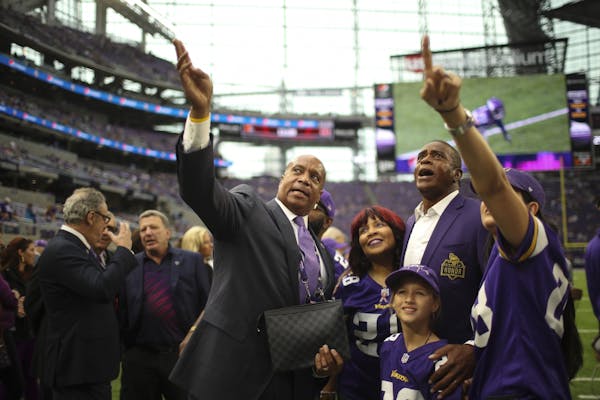The Big Ten will name Vikings chief operating officer Kevin Warren to be its next commissioner to replace Jim Delany, an NFL source confirmed Monday night. The official announcement is at 11 a.m. Tuesday.
Delany, 71, will step down in June 2020. He has been commissioner since 1989.
The 55-year-old Warren is the highest-ranking black man on the business side of an NFL team and would be the first black commissioner of a Power Five conference.
The Big Ten used the Chicago firm Korn Ferry to search for Delany's replacement, a search headed by Northwestern President Morton Schapiro. The Chicago Tribune reported Monday that Northwestern athletic director Jim Phillips was the leading candidate for the post.
Warren played a key role in the construction of U.S. Bank Stadium and the Vikings' training complex, TCO Performance Center, in Eagan. He is also known for his charity work in and around the Twin Cities, and told the Star Tribune in a 2017 profile that his goal was to own an NFL team.
"He can go anywhere and do anything," the late Mike Slive, former Southeastern Conference commissioner and a one-time law firm colleague, said in that story.
"I could see him in New York, at the NFL office at a very high level."
Warren played college basketball at Penn and Grand Canyon State, and has an MBA from Arizona State and a law degree from Notre Dame.
He was vice president of football administration for the St. Louis Rams and senior vice president of business operations for the Detroit Lions, but was back practicing law in 2004 when he was contacted to become part of a group headed by Reggie Fowler that tried to buy the Vikings from Red McCombs. The sale fell through, but Warren became a limited partner when the Wilf family purchased the Vikings.
In 2014, Warren and his wife, Greta, donated $1 million to a pediatric emergency care fund at Minnesota Masonic Children's Hospital. In 2016, he was part of the search firm that landed Mark Coyle as Gophers athletic director.
Under Delany, the Big Ten expanded from 10 to 14 schools by adding Penn State, Nebraska, Maryland and Rutgers. He was commissioner when the Big Ten Network was launched, leading to millions of dollars in revenue for conference schools, and was a key player in the formation of the Bowl Championship Series.


